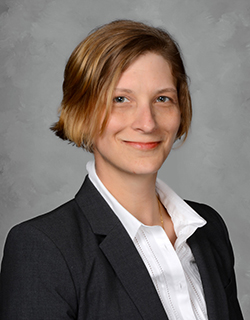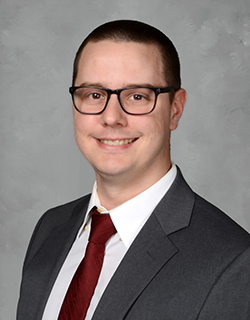Scholarly Concentrations at Indiana University School of Medicine offer an optional experience that complements the core medical school curriculum and empowers students to delve into topics of personal interest, learn through topic-specific courses, complete a scholarly project, and produce a manuscript submitted for publication along with a poster for presentation at IU School of Medicine Education Day.
Students in the Scholarly Concentrations Program benefit from the school’s statewide network of experts and resources, receive unique mentorship opportunities, develop skills, and complete scholarly work, all elements of their medical education that are valuable for residency applications and professional development.
Students in the Rural Health Scholarly Concentration share their experiences with the program, examining what they’ve learned and how the program has shaped their medical school journey.
Rural Health (Terre Haute)
Sarah Hopfer, Class of 2023

Why did you choose the Rural Health Scholarly Concentration?
If students are on the Terre Haute campus for four years, it's because they’re in the Rural Medical Education Program (RMEP). For me, the scholarly concentration in Rural Health was an opportunity to dive a little bit deeper into rural medicine than what we're exposed to just through the RMEP. And especially living out here in a more rural area, the Scholarly Concentration gave me an opportunity to learn about and connect with the community around me a little bit more.
What’s been your favorite part of your Scholarly Concentration experience so far?
There are a couple of things. One is that it has helped me to learn more about my community. I had research sites in three different places, so going out and meeting my site leaders and the folks who'd be actually carrying out the surveys for me, I really enjoyed that – especially getting to know the patient population of Indiana a little bit better. That was really interesting to me and a lot of fun.
But I also enjoyed having the chance to dive into a topic of my own interest and being able to develop that further. I got to use some of my time as a medical student to work on a project that could hopefully do some good for my community. That's really cool. There are opportunities to connect with the community when you're working with patients, but there aren’t many opportunities to make a difference on the scale of conducting research projects, learning something that can eventually be published, and helping not just your local community but even broader communities.
How has participating in the Rural Health Scholarly Concentration shaped your medical school journey?
We started working on the Scholarly Concentrations Program in our second year with Journal Club. We’d meet with our advisor and a statistician to go over the articles that we'd read for Journal Club. That not only gave us a better sense of the field that we were going to be doing a little bit of research in, but it also really helped me along the way with the USMLE Step 1 and Step 2 Boards. It helped reinforce the skills that we had learned in statistical analysis, comprehending the research when we encounter it, and putting that into actual practice. We were using it to understand the actual literature of the field we were working in, so it made an impact in that way. That was really helpful, especially early in our preclinical years.
Much of my last year has been structured around thinking about my research and the project that was being implemented. We had folks doing surveys for three months, and it's sort of always part of my world. It's been beneficial in that way to have something consistent going on.
How has your work with your Scholarly Concentration come up in residency interviews?
I'm pretty early in the interview season right now for applying to residency, but I've talked about this project in most of my residency interviews so far. The Scholarly Concentrations Program augments the curriculum along the way and then gives students some advantages. for residency applications as well. It’s given me some depth to have this research experience along with my clinical experiences, service, work and leadership.
What scholarly project have you chosen to undertake and why?
I did a survey of patients coming to three rural clinics in Western Indiana to learn more about what they know of carbon monoxide poisoning and behaviors that can affect their chances of encountering carbon monoxide. Essentially, I gave them a test asking what they know about carbon monoxide and which behaviors are safe and which are not. I also asked some other questions about their general experiences with carbon monoxide.
This came about through a resolution that a colleague and I wrote for the Indiana State Medical Association after one of our professors told us a story about his childhood teacher who passed away from carbon monoxide poisoning. She was a beloved member of the community, and that really touched me and my colleague. We started looking into carbon monoxide laws in the state of Indiana and the prevalence of carbon monoxide poisoning. What we learned was that for its population, the Midwest generally has a disproportionate number of non-fire-related, unintentional carbon monoxide poisonings compared to the rest of the United States. So I really wanted to learn more about why that might be. I chose to look at rural areas because research shows that, in general across the world, carbon monoxide poisoning seems more frequent in rural areas due to using fuel burning to heat the home and cook and such.
I really wanted to learn more about what people knew about carbon monoxide poisoning in rural areas in Indiana and what they knew about how to protect themselves, so maybe we could think about more targeted public health campaigns and being able to protect our community members a little bit better.
Joe Riggs, Class of 2023
Why did you choose the Rural Health Scholarly Concentration?
I grew up in a rural town in East-Central Illinois, where if you really needed any kind of specialty care, you had to travel outside of our town. So I went into Rural Health because I would like to be able to reach out to rural communities that don't really have access to a lot, outside of a couple of family medicine doctors or just very basic primary care, and be able to offer specialized care – or to offer care in general to areas that might be hurting in terms of not having a whole lot of providers in the area.
What’s been your favorite part of your Scholarly Concentrations Program experience so far?
My favorite part of the Scholarly Concentrations Program has been the project that I've gotten to work on. It's allowed me to really dive deeply into issues with cancer care that are faced by a broad range of people, whether it's people in rural areas or just people in general. I grew up in a small town, and I knew what affected us as people and community members of that small town. It’s really cool to be able to dive into the numbers and statistics that show that it's not just a Midwest thing, but it's small rural towns and small populations all across the United States that are affected by this. I loved to really get to see those numbers and hopefully be part of a group of people who are bringing these issues to light and providing pathways to help alleviate the stress that is faced by people in rural areas.
How has participating in the Rural Health Scholarly Concentration shaped your medical school journey?
With the Scholarly Concentrations Program, we have some generalized classes that everyone takes in public health and things like that. So it's given me a little bit more exposure to public health courses and a wider knowledge of public health and how that affects the public in general, without having to go through and do an extra full year of a Master's in Public Health. It’s shown how public health kind of melds into this idea of rural health and how rural health is important and has been affected over the past several years by a growing deficit of physicians in rural areas.
Outside of that, I'm also in the Rural Medical Education Program (RMEP), which has allowed me to spend my clinical years in Terre Haute. I've been able to do a lot more hands-on stuff in Terre Haute where it's just been me and the physician; there haven’t been any other medical students or residents or fellows or anything like that. So I've been able to get a lot of hands-on experience and exposure to health care in some more rural areas that surround Terre Haute as well.
What scholarly project have you chosen to undertake and why?
My Scholarly Concentrations project is about disparities in cancer care for patients with metastatic melanoma. The main focus is on rural disparities, but it also does branch into disparities of people with different socioeconomic statuses, as well as the effects that race has on everything. It started off as a focus on rural disparities and branched out as I've found some interesting stuff to go along with it.
My main interest in the project started because I have an interest in cancer care. I've had a couple of family members who were diagnosed with cancer and passed away when I was younger, who didn't really have access at the time to specialized cancer care in my hometown. So I just wanted to dive deeper and explore what the setup is and how cancer care is affected in rural areas versus other areas.
